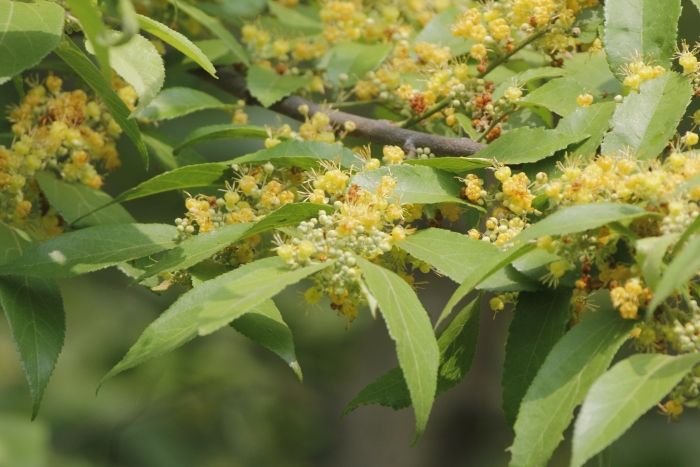West Indian Elm
(Guazuma ulmifolia)
West Indian Elm (Guazuma ulmifolia)
/
/

© Juan Cruzado Cortés
CC BY-SA 4.0
Image By:
© Juan Cruzado Cortés
Recorded By:
Copyright:
CC BY-SA 4.0
Copyright Notice:
Photo by: © Juan Cruzado Cortés | License Type: CC BY-SA 4.0 | License URL: http://creativecommons.org/licenses/by-sa/4.0/ | Uploader: juancruzado | Publisher: iNaturalist |

























Estimated Native Range
Summary
Guazuma ulmifolia, commonly known as West Indian Elm or Bastard Cedar, is a deciduous to semi-deciduous tree native to tropical dry forests, secondary forests, and disturbed areas in the Caribbean, South America, Central America, and Mexico. It typically grows to a height of 20-30 feet (6-9 meters) in cultivation, though it can reach up to 98 feet (30 meters) in its natural habitat. The tree has a straight trunk with a dense, spreading crown and rough, gray-brown bark. The leaves are elm-like, and the small, yellowish-green flowers are not particularly showy, blooming intermittently throughout the year. It produces a fruit that is a small, round capsule covered in bristles.
West Indian Elm is appreciated for its rapid growth and adaptability to a range of soil types, including those with poor fertility. It is often used for reforestation projects, as a shade tree in coffee and cacao plantations, and for its wood, which is used in carpentry and to make charcoal. The leaves and bark have medicinal properties and are used in traditional medicine. In cultivation, it prefers full sun to partial shade, requires moderate water, and tolerates drought once established. However, it can be susceptible to pests like the Guazuma leaf beetle. Gardeners should be cautious as it can become invasive outside its native range due to its prolific seed production and rapid growth.CC BY-SA 4.0
West Indian Elm is appreciated for its rapid growth and adaptability to a range of soil types, including those with poor fertility. It is often used for reforestation projects, as a shade tree in coffee and cacao plantations, and for its wood, which is used in carpentry and to make charcoal. The leaves and bark have medicinal properties and are used in traditional medicine. In cultivation, it prefers full sun to partial shade, requires moderate water, and tolerates drought once established. However, it can be susceptible to pests like the Guazuma leaf beetle. Gardeners should be cautious as it can become invasive outside its native range due to its prolific seed production and rapid growth.CC BY-SA 4.0
Plant Description
- Plant Type: Shrub, Tree
- Height: 30-59 feet
- Width: 20-39 feet
- Growth Rate: Moderate, Rapid
- Flower Color: White, Yellow
- Flowering Season: Summer, Fall
- Leaf Retention: Deciduous
Growth Requirements
- Sun: Full Sun
- Water: Medium, High
- Drainage: Medium, Fast
Common Uses
Bird Garden, Butterfly Garden, Erosion Control
Natural Habitat
Native to tropical dry forests, secondary forests, and disturbed areas
Other Names
Common Names: West Indian Elm, Guacima, Guásimo, Bay Cedar, Musket Tree, Bolaina Negra
Scientific Names: , Guazuma ulmifolia, Bubroma guasuma, Bubroma guazuma, Bubroma polybotryum, Bubroma tomentosum, Bubroma ulmifolia, Diuroglossum rufescens, Guazuma blumei, Guazuma bubroma
GBIF Accepted Name: